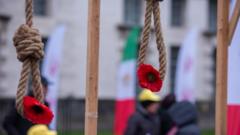The United Nations reveals a stark rise in executions in Iran, with serious implications for human rights and the country's legal system.
Iran's Execution Rate Hits Alarming High in 2024, UN Reports

Iran's Execution Rate Hits Alarming High in 2024, UN Reports
Concerns grow as Iran's executions surge to the highest level in nearly a decade, impacting marginalized groups.
In a troubling report, the United Nations has disclosed that at least 901 individuals were executed in Iran in 2024, marking the highest figure in nine years—a 6% increase from the previous year’s total of 853 executions. UN Human Rights Chief Volker Türk emphasized the alarming trend, noting a chilling persistence in the application of the death penalty. "It is deeply disturbing that yet again we see an increase in the number of people subjected to the death penalty in Iran year-on-year," he stated, calling for an end to this continuous practice.
The report highlights that a significant number of those executed were convicted of drug-related offenses, alongside cases involving dissidents and participants linked to the widespread protests that erupted in 2022. Of particular concern is the rise in executions of women, with Norwegian NGO Iran Human Rights (IHR) documenting the execution of at least 31 women in 2024—the highest number since monitoring began 17 years ago.
Among these cases were horrifying instances such as that of Leila Ghaemi, who was sentenced to death after a tragic incident involving her daughter, and Parvin Mousavi, who was executed for unknowingly transporting illicit drugs. Critics argue that the imposition of the death penalty for drug offenses does not comply with the international law stipulation that capital punishment should only apply to "the most serious crimes."
The report also sheds light on the troubling ethnic disparities within the execution statistics. More than half of the individuals executed were from ethnic minority groups, including 183 Kurds, exposing a systemic bias in the enforcement of capital punishment. This escalation comes amid the ongoing governmental repression following the "Woman, Life, Freedom" protests—a movement spurred by the death of Mahsa Amini while in custody for supposed hijab violations.
Moreover, HRANA reported the execution of five juvenile offenders, contravening international norms that prohibit capital punishment for crimes committed by minors. Amnesty International labeled Iran responsible for 74% of all executions globally in the previous year, excluding China's classified statistics on its capital punishment practices.
Universal calls for the abolition of the death penalty in Iran are intensifying, with the UN urging authorities to impose a moratorium and reconsider the ethical implications of capital punishment as a whole.





















